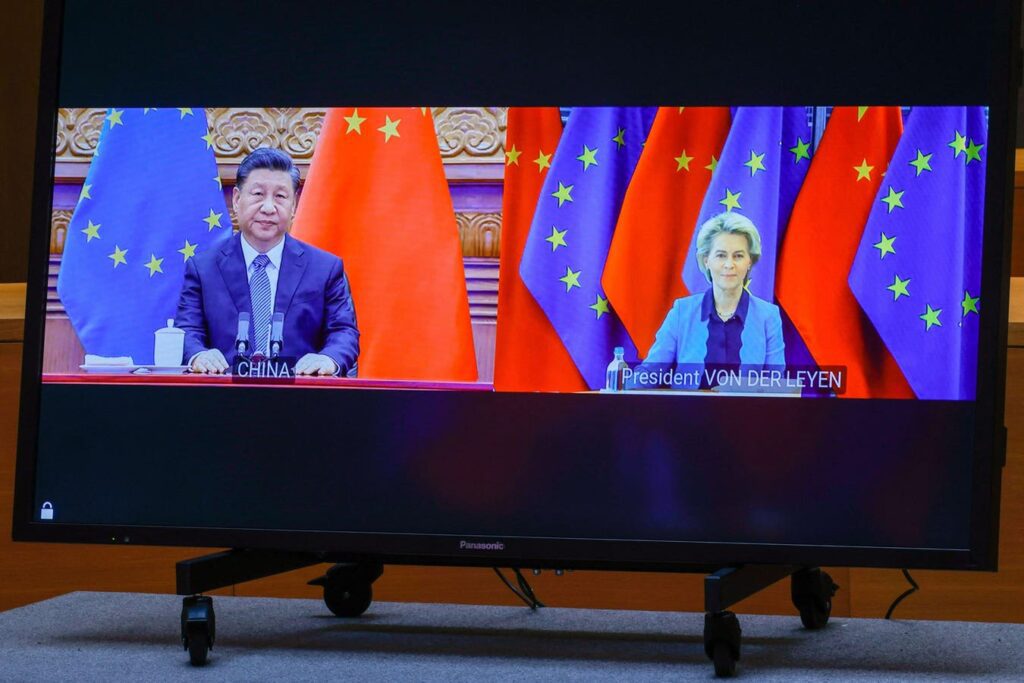China’s President Xi Jinping (L) and European Commission President Ursula von der Leyen speak via video-conference with European Council President and European Union foreign policy chief during an EU China summit at the European Council building in Brussels, on April 1, 2022.
OLIVIER MATTHYS/POOL/AFP via Getty Images
Iran did not really have a choice. Nor did North Korea. But China had a choice. In other words, did China make the right bet in supporting Vladimir Putin and Russia’s invasion of Ukraine?
Formally, meaning rhetorically, China does not support the invasion. But in practical terms, it has evolved to become Russia’s most important trading partner and most important supplier of military material.
Neither Iran nor North Korea really had a choice because they had no particular economic relationship with Europe, nor any prospects of developing one. They were both under a range of economic sanctions that restricted their options—this on top of their own economic mismanagement that made engagement of limited value to Europe. So why not offer whatever support they could to Russia as one of the few nations that would do business with them and shared their resentment of the democratic West?
China was very much in a different situation, however, with a successful (though slowing) economy and a wide range of trade and investment relations with Europe. The EU places EU-China 2023 trade at almost 740 billion euros (about $790 billion), over four times Russia-China trade. And Europe has long since lost geopolitical connectivity to Asia, so that the Chinese assertiveness in Asia that rubs the U.S. the wrong way has much less of an impact in Europe.
In sum, the Europe-China relationship had value for both participants and was worth nurturing, particularly as U.S.-China relationship soured.
Why then has China gone all-in on Putin?
One theory is that China’s support of Putin developed through incremental mistakes. China backed Putin before the war started, not imagining that Russia would undertake a full-scale invasion. Nor did they contemplate the duration or the damage of the war, but once the war started there was no easy way for them to extricate themselves. Even today there remains an open possibility of a Putin victory or at least Putin avoiding an out-and-out defeat. In other words, this was more or less a miscalculation.
A second theory is that Europe has made this cost-free. China has been able to maintain, and even enhance, its economic relationship with Europe even as it supports Putin’s invasion. The EU could start attaching an economic cost to China’s bet, by joining the Trans-Pacific Partnership trade agreement (as the U.K. has already done) or pursuing a Free Trade Agreement with Taiwan. What about a “Mini-FTA” between the EU and the U.S. in which all items with, say, less than 2% tariff would immediately become duty-free? Even adopting a simple U.S.-EU accord on automobiles or electric vehicles would improve Europe’s competitiveness. But Europe seems dead in the water and oblivious to any need to attach a cost to China’s behavior.
So ignore the morality of the decision, ignore the human cost of this war, and look at it simply in terms of Realpolitik. China sees this as an opportunity to reduce the credibility of the U.S. and its allies.
The message from a Putin win, or even a draw, would be: To be careful about any security arrangement with the U.S. because these commitments don’t mean much. The U.S. has little appetite for a long-term engagement and U.S. politics means it will fatigue after a few years. It may be time to think about an accommodation with China.
I had the chance to visit with a senior-level EU delegation that was visiting San Francisco and they vigorously disputed that China was getting away cost-free. “We complain about their actions every time we meet with them,” one official stated.
This is a self-negating assertion. If the EU response is limited to a series of complaints, then China’s actions are indeed cost-free. More reassuringly, I subsequently had lunch with two visiting members of the German Bundestag, both of whom termed the Russian invasion as a matter of grave concern for Germany and that a policy response was required. So even if Brussels has no ideas or tools as to how to respond, Berlin apparently does. Because if formal complaints are the chief response to China, then from its point of view, China’s bet against Europe was the right bet. By not giving China a red light, the EU in effect gives it a green light.
Source link : https://www.forbes.com/sites/franklavin/2024/06/16/why-did-china-bet-against-europe/
Author :
Publish date : 2024-06-16 11:09:37
Copyright for syndicated content belongs to the linked Source.
